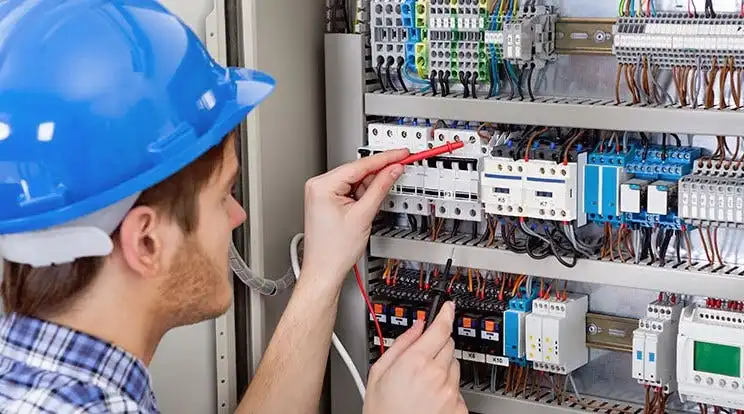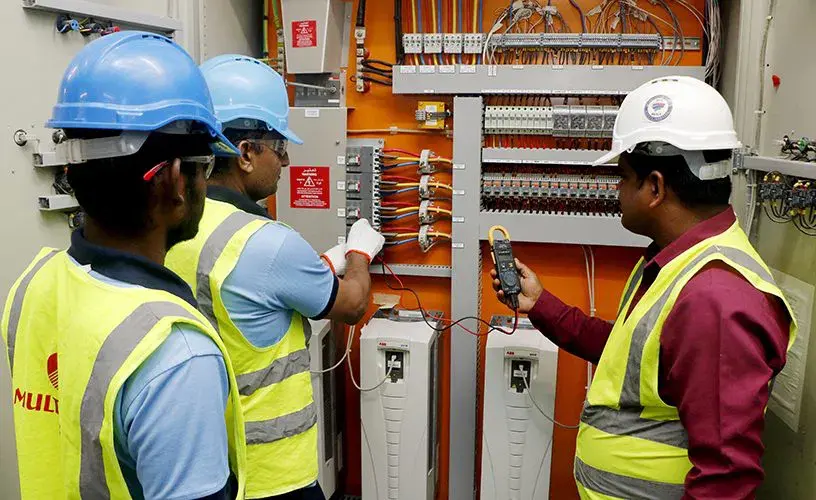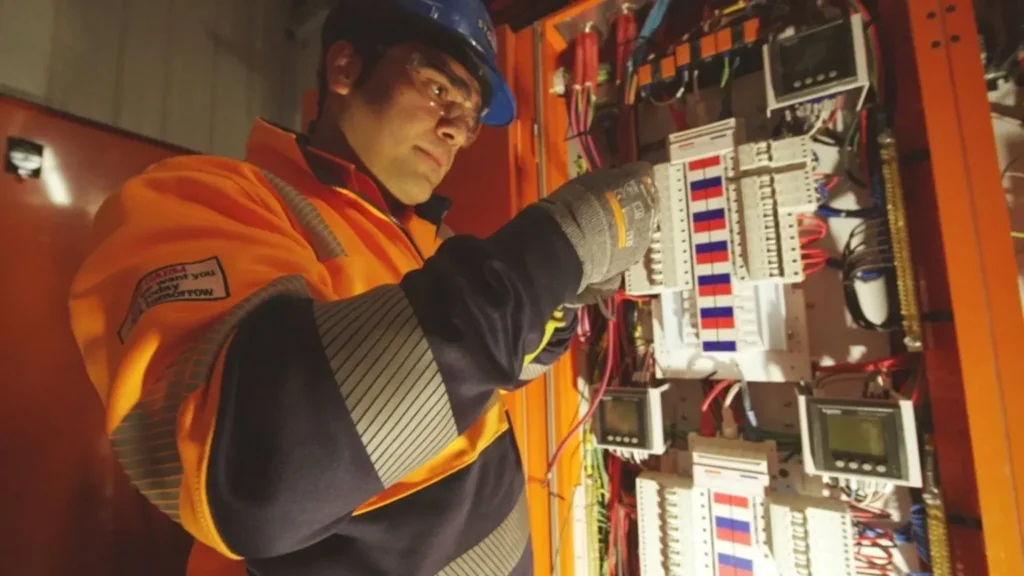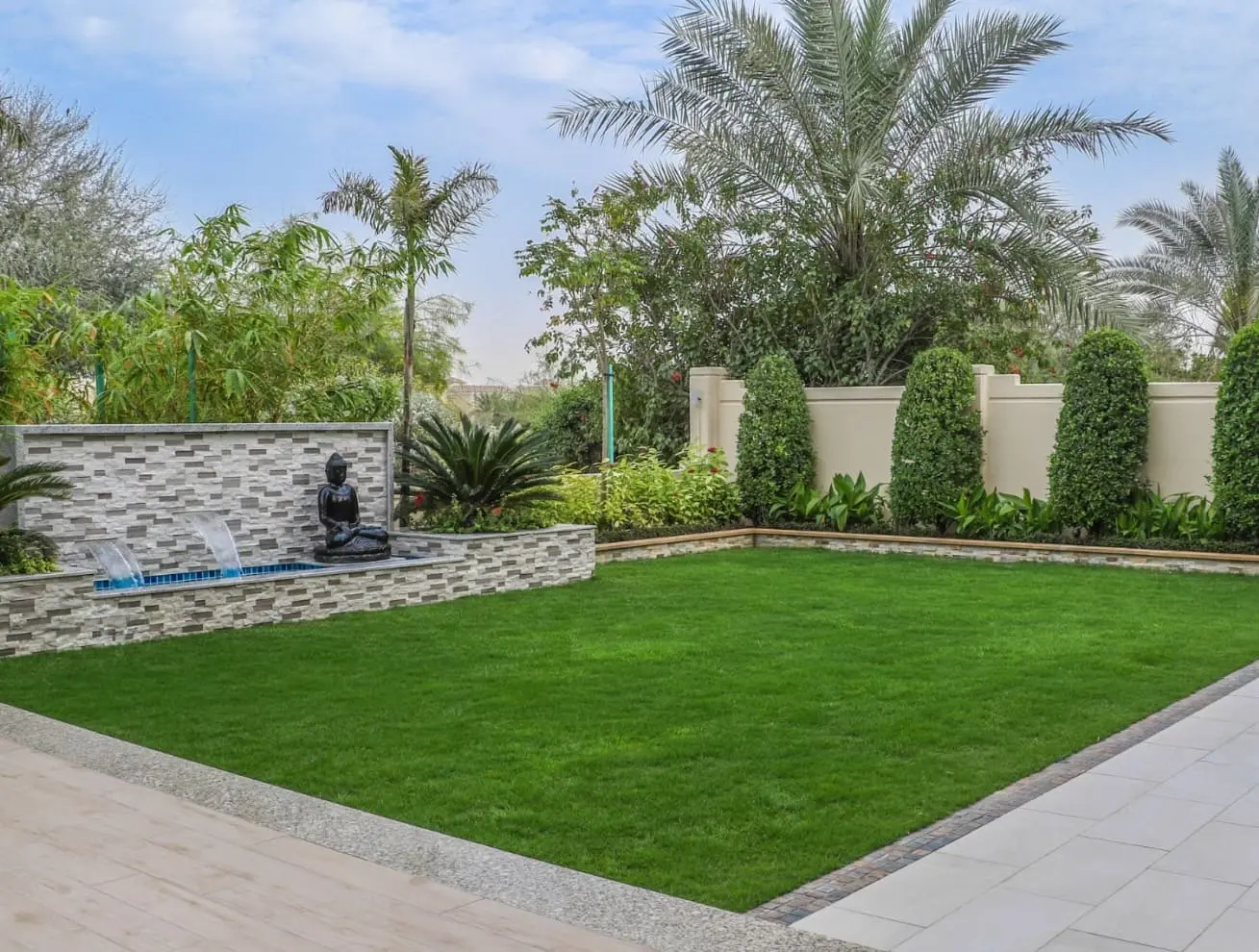If you are looking for a reliable landscaping service in Al Bahra South Dubai, The Maintenance Work is your trusted local choice. We provide...
Electrify Your Savings: Mastering Energy-Saving Electrical Work in Dubai’s Desert Climate
Dubai stands as a beacon of modern ambition, a dazzling metropolis sculpted from the desert. Its skyline, a forest of architectural marvels, and its relentless pace of development are truly awe-inspiring. However, this extraordinary growth comes with an equally extraordinary demand for energy. Powering the vast air-conditioned spaces, the glittering lights, the industrial zones, and the ever-expanding residential communities places immense, continuous pressure on the emirate’s electrical grid.
Keytakeaways:
- The Imperative: High AC usage (60%+ of summer load) drives costs and emissions. Efficiency reduces bills, boosts property value, and aligns with Dubai’s Net Zero 2050 target.
- Lighting First: Switching to LEDs (90% less energy) and adding smart controls (sensors, timers) is the fastest, most cost-effective starting point for energy-saving electrical work.
- Conquering Climate (HVAC/Appliances): Smart thermostats and high-efficiency inverter AC units are crucial. Maintain systems regularly and choose energy-star appliances.
- Harness Solar: Dubai’s abundant sun makes rooftop solar PV a powerful energy-saving electrical work solution, reducing grid reliance via net metering (Shams Dubai).
- Hidden Infrastructure: Upgrading old wiring, panels, and adding Power Factor Correction (especially commercial) reduces hidden energy losses and improves safety.
- Audit = Blueprint: A professional energy audit identifies waste and prioritizes cost-effective energy-saving electrical work measures with clear ROI.
This energy intensity translates directly to the wallets of residents and businesses alike. Electricity bills, particularly during the peak summer months, can become a significant burden. The traditional model of simply generating more power to meet rising demand is increasingly unsustainable, both economically and environmentally. Recognizing this, Dubai has embarked on a visionary path towards clean energy and efficiency, setting ambitious targets. This shift places a powerful tool directly in the hands of every building owner and occupant: proactive Energy-Saving Electrical Work. It’s no longer just about convenience; it’s about conscious consumption, financial prudence, and contributing to the city’s broader sustainability goals, transforming the power paradox into an opportunity for smarter living.
Why Energy-Saving Electrical Work is Dubai’s Imperative
The need for widespread Energy-Saving Electrical Work in Dubai transcends simple cost reduction; it’s a critical response to a confluence of pressing factors. Firstly, the sheer scale of energy consumption, driven predominantly by air conditioning which can account for over 60% of a building’s peak load in summer, creates significant strain on infrastructure. This leads to higher operational costs for utilities, potential grid instability risks, and increased reliance on fossil fuels, despite impressive strides in solar adoption. Reducing this peak demand through efficiency is essential for grid reliability and avoiding the need for constant, costly infrastructure expansion. Furthermore, the environmental impact is undeniable. Lowering energy consumption directly correlates with reducing greenhouse gas emissions and the city’s carbon footprint, aligning with the UAE’s Net Zero by 2050 Strategic Initiative and Dubai’s own Clean Energy Strategy 2050.

Secondly, the economic argument is compelling for individual consumers and businesses. Electricity tariffs, while partly subsidized historically, reflect the true cost of generation and delivery more accurately now. Implementing Energy-Saving Electrical Work – from simple upgrades to comprehensive retrofits – offers a direct and often rapid return on investment through slashed utility bills. These savings can be substantial, freeing up capital for other priorities. Moreover, as Dubai positions itself as a global hub for sustainability and innovation, buildings with demonstrably high energy efficiency ratings gain a competitive edge. They attract environmentally conscious tenants, command potentially higher rental premiums, and enhance corporate social responsibility profiles. Embracing this work is not just prudent; it’s becoming essential for long-term value and market positioning in a city focused on a green future.
Illuminating Savings: Lighting – Your First Spark of Efficiency
Often overlooked, lighting represents one of the quickest, most impactful, and cost-effective starting points for Energy-Saving Electrical Work in any Dubai property. Outdated incandescent bulbs and even many older fluorescent tubes are energy vampires, converting a significant portion of the electricity they consume into heat rather than light – heat your AC then has to work even harder to remove! The revolution in LED (Light Emitting Diode) technology has completely transformed this landscape. Modern LEDs consume up to 90% less energy than incandescent bulbs and last 15-25 times longer, dramatically reducing both energy bills and replacement costs. Their versatility in color temperature (from warm white to cool daylight) and dimmability options also enhance ambiance and comfort.
Upgrading to LEDs is a prime example of accessible Energy-Saving Electrical Work. While replacing individual bulbs is a simple DIY task, a comprehensive approach yields the best results. A professional electrician can assess your entire lighting scheme, recommend optimal high-efficiency LED fixtures for different areas (downlights, panel lights, street lighting), ensure correct installation for maximum lifespan and performance, and potentially integrate smart controls. These controls – including motion sensors for infrequently used areas (storage rooms, parking garages, corridors), daylight harvesting sensors that dim lights near windows when natural light is sufficient, and programmable timers – add another layer of intelligence, ensuring lights operate only when and where needed, at the appropriate level. This holistic lighting overhaul provides an immediate and visible reduction in your energy draw.
Conquering the Climate: Smart HVAC & Appliance Efficiency
Given Dubai’s climate, Heating, Ventilation, and Air Conditioning (HVAC) systems are the undisputed champions of energy consumption. Optimizing their performance is therefore the single most significant area for impactful Energy-Saving Electrical Work. The era of basic thermostats is over. Installing smart, programmable thermostats is a crucial upgrade. These intelligent devices learn your schedule and preferences, automatically adjusting temperatures when you’re asleep or away, preventing wasteful cooling of empty spaces. Many can be controlled remotely via smartphone apps, allowing you to adjust settings on the go – perfect for unexpected schedule changes. Crucially, they provide valuable usage data, helping you understand your patterns and identify further savings opportunities. Integrating these thermostats often involves specific electrical wiring expertise, making professional installation part of effective Energy-Saving Electrical Work.
Beyond controls, the efficiency of the HVAC units themselves is paramount. If your system is over a decade old, it’s likely significantly less efficient than modern inverter-driven models. Replacing an old, struggling unit with a high Seasonal Energy Efficiency Ratio (SEER) or Energy Efficiency Ratio (EER) rated inverter system can yield massive energy savings, often paying for itself within a few years through lower bills. Regular, professional maintenance – cleaning coils, checking refrigerant levels, ensuring ductwork is sealed – is non-negotiable electrical and mechanical upkeep that maintains peak efficiency. Don’t forget other major appliances! Refrigerators, washing machines, dryers, and water heaters also consume substantial power. When replacing them, prioritize those with high energy star ratings (look for the Emirates Energy Star label). Simple behavioral changes, like running full loads in washers and dryers, using cold water washes, and ensuring refrigerators aren’t overfilled or set excessively cold, complement appliance-focused Energy-Saving Electrical Work perfectly.
Harnessing the Desert Sun: Solar Power Integration
Dubai is blessed with an abundance of one of the world’s most potent renewable resources: sunlight. Integrating solar photovoltaic (PV) systems is no longer a futuristic concept; it’s a highly viable and increasingly accessible form of Energy-Saving Electrical Work for homeowners, businesses, and even large developments. Rooftop solar panels convert sunlight directly into electricity, offsetting a significant portion of your consumption drawn from the grid. This directly translates to lower monthly DEWA (Dubai Electricity and Water Authority) bills. Advances in technology have made panels more efficient and affordable than ever, while improved installation techniques ensure durability even in harsh desert conditions. Net metering policies in Dubai allow you to feed excess electricity generated during the day back into the grid, earning credits that offset your consumption at night or during cloudy periods.

Implementing a solar PV system requires specialized Energy-Saving Electrical Work. It involves more than just mounting panels. Qualified professionals conduct site assessments to determine optimal panel placement and system size based on your roof space, orientation, shading, and energy consumption patterns. They handle the complex electrical integration: installing inverters (which convert the DC power from panels to usable AC power), connecting to your building’s main distribution board safely and compliantly, setting up the net metering connection with DEWA, and ensuring the entire system meets stringent Dubai regulations and safety standards (like those from the Dubai Supreme Council of Energy). This investment not only slashes bills but also provides a degree of energy independence, protects against future tariff increases, significantly reduces your carbon footprint, and adds tangible value to your property, making it a cornerstone of modern energy efficiency in the region.
The Hidden Network: Wiring, Panels & Power Factor Perfection
While flashy gadgets get attention, the true backbone of energy efficiency lies hidden within your walls and electrical cabinets: the wiring, distribution panels, and overall power quality. Outdated, damaged, or improperly sized wiring is not just a safety hazard; it’s a source of significant energy loss through resistance, generating wasteful heat. Similarly, an old, overloaded, or poorly configured main electrical panel or sub-panels can lead to voltage drops, inefficiencies, and even damage sensitive electronics. Modernizing this infrastructure is fundamental Energy-Saving Electrical Work. Replacing old aluminum wiring with higher-capacity copper, ensuring all connections are tight and corrosion-free, and upgrading panels to handle modern loads safely and efficiently lay the groundwork for all other energy-saving measures to function optimally.
Another often-overlooked aspect is Power Factor (PF) correction, particularly crucial for commercial and industrial buildings with heavy inductive loads (like large motors, transformers, and old fluorescent lighting ballasts). A low power factor means the electrical system draws more current than necessary to deliver the same real power (kW), resulting in higher electricity bills (as utilities often charge for apparent power, kVA) and placing unnecessary strain on transformers and wiring. Installing automatic Power Factor Correction (PFC) units is a sophisticated form of Energy-Saving Electrical Work. These devices, typically capacitor banks, counteract the reactive power demand, improving the PF closer to the ideal value of 1.0. This reduces the total current flowing through the system, leading to lower energy losses in cables and transformers, reduced utility charges (where kVA billing applies), increased system capacity, and improved voltage stability. A professional energy audit can identify if PF correction is beneficial for your premises.
The Expert Eye: Professional Energy Audits – Your Blueprint
Embarking on a journey of energy efficiency without a map is inefficient. A professional energy audit is the essential diagnostic tool and the indispensable first step in any serious Energy-Saving Electrical Work strategy. Think of it as a comprehensive health check-up for your building’s energy metabolism. Certified energy auditors use specialized equipment – like thermal imaging cameras to spot insulation gaps and air leaks, power loggers to measure the actual consumption patterns of circuits and major equipment, blower doors to quantify building envelope leakage, and combustion analyzers for fuel-burning systems – combined with detailed data analysis and visual inspection. They don’t just identify where energy is being used; they pinpoint how it’s being wasted.
The outcome of a professional energy audit is a detailed report, your personalized blueprint for savings. This report prioritizes recommended Energy-Saving Electrical Work and other efficiency measures (like insulation or window upgrades), providing clear estimates of the energy savings potential, implementation costs, and projected payback periods for each measure. It moves beyond generic advice, offering tailored solutions specific to your building’s construction, systems, occupancy patterns, and budget. This data-driven approach allows you to make informed investment decisions, focusing first on the “low-hanging fruit” with the fastest returns before tackling larger projects. Whether for a villa, an apartment building, an office, or a factory, an audit transforms guesswork into a strategic, cost-effective roadmap for significantly reducing energy consumption and operational costs.
Dubai’s Green Thrust: Incentives and Your Role
Dubai’s leadership is not merely advocating for energy efficiency; it’s actively creating an enabling environment through robust policies, initiatives, and incentives. The Dubai Supreme Council of Energy (DSCE) and Dubai Electricity and Water Authority (DEWA) are driving forces. Landmark initiatives like the Dubai Integrated Energy Strategy 2030 and the Dubai Clean Energy Strategy 2050 set clear, ambitious targets for reducing energy demand and increasing the share of clean energy. Regulations like the Green Building Regulations and Specifications, applicable to new constructions and major retrofits, mandate specific energy performance standards, directly encouraging efficient design and Energy-Saving Electrical Work from the outset. The Al Safat (or Barjeel) building rating system further classifies buildings based on their energy and water efficiency, providing market recognition.
Understanding and leveraging available incentives is crucial. DEWA offers the Shams Dubai initiative, streamlining the process for rooftop solar PV grid connection and net metering. While direct cash rebates for efficiency upgrades might be less common than in some regions, the long-term savings through reduced bills are substantial. More importantly, investing in Energy-Saving Electrical Work aligns your property with Dubai’s future-proof vision. Efficient buildings face lower risks from potential future carbon taxes or stricter regulations. They enhance corporate sustainability credentials (ESG reporting), attract environmentally conscious tenants and employees, and contribute directly to Dubai’s resilience and global leadership in sustainability. Your individual or organizational commitment to efficiency, guided by professional audits and upgrades, is an integral part of achieving the emirate’s ambitious and necessary green goals.
Sustaining the Spark: Long-Term Benefits of Energy-Saving Electrical Work
The immediate benefit of Energy-Saving Electrical Work – reduced utility bills – is undeniably powerful, offering quick relief to operational budgets and household expenses. However, the true value extends far beyond the next monthly statement. Financially, the savings compound year after year, providing an ongoing return on your investment. Upgraded efficient systems, particularly HVAC and lighting, typically have longer lifespans and require less frequent repairs compared to older, inefficient models, translating to lower long-term maintenance and replacement costs. Furthermore, properties demonstrably equipped with modern, efficient electrical systems and technologies like solar panels often see an appreciable increase in market value and rental potential, as buyers and tenants increasingly prioritize sustainability and lower operating costs.

The environmental benefits are profound and enduring. Every kilowatt-hour saved reduces the demand for fossil fuel-based power generation, directly cutting greenhouse gas emissions (like CO2) and other pollutants (SOx, NOx) associated with electricity production. This contributes significantly to combating climate change and improving local air quality. Enhanced Energy-Saving Electrical Work also improves the overall resilience and safety of your building’s electrical infrastructure, reducing fire risks associated with faulty wiring or overloaded circuits. Modern systems provide better power quality, protecting sensitive electronic equipment from surges or sags. Ultimately, embracing this work fosters a culture of resource consciousness and responsibility, positioning individuals and businesses as active participants in creating a more sustainable, efficient, and prosperous future for Dubai, ensuring the city’s brilliance continues to shine without overburdening its resources.
Your Efficient Future: Taking the First Electrified Step
The path to significant energy savings and a more sustainable footprint in Dubai is clear and actionable. Ignoring the potential of Energy-Saving Electrical Work means continuing to pay unnecessarily high bills, contributing to avoidable strain on the grid and the environment, and potentially falling behind as the city accelerates its green transition. The knowledge and technologies are readily available; the imperative is to act. Begin by shifting your perspective: view electricity not just as a utility cost, but as a manageable resource where intelligent investment yields continuous returns. Conduct an honest assessment of your current consumption patterns – scrutinize your DEWA bills, observe when and where energy is used most, and identify obvious inefficiencies like old lighting or drafty windows near AC units.
Your most powerful next step is to engage a qualified professional. Seek out certified energy auditors or reputable electrical contracting firms in Dubai specializing in energy efficiency solutions. Discuss your goals and concerns. Schedule that crucial energy audit – it’s the investment that unlocks the roadmap to your savings. Based on the audit’s findings, prioritize the Energy-Saving Electrical Work that offers the best return for your specific situation. Whether it’s a comprehensive LED lighting retrofit, installing a smart thermostat, exploring solar PV, or addressing foundational issues like wiring and power factor, each step contributes. Remember, this isn’t just about technology; it’s about cultivating mindful energy habits alongside the upgrades. By taking that first informed step today, you actively lower your bills, enhance your property’s value and comfort, and contribute meaningfully to powering Dubai’s dazzling future responsibly and efficiently. The spark of savings awaits your action.



